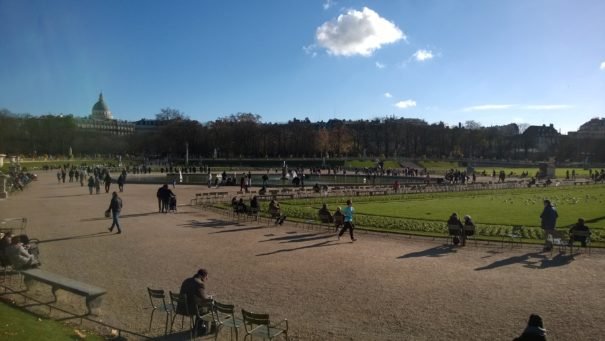
A Most Triumphant Hubbub

A Most Triumphant Hubbub
Coque Eggs in Paris
I visited Paris one week after the November 13th attacks. Many people expressed apprehension before I left. When I returned, one of my friends asked, “Was it grim?” But it wasn’t at all. It really, really wasn’t.
The city never seemed more exquisite, in fact. That first Sunday morning as I walked around, the sun was shining and putting halos on everything. I had just come out of the Église St. Germain de Pres, the oldest church in Paris, and the pigeons flew up before my feet like in a perfume ad. The sun was throwing itself against the wall across the square as if to say, “Love me!”
I was hungry. My day had started earlier than usual because I had traveled from a later time zone, and I was ready for breakfast. I wanted to go to Les Éditeurs, a favorite café in the neighborhood, but it wasn’t open until noon. So I went to Café de Flore.
This is not a place I would normally choose. Of course, I had been on my first visit to Paris years earlier, for the literary history and because one should go at least once. But it seemed too overexposed, too overpriced, too Bobo. Still, it was open that morning. I had passed it on my way to the church, and it was arrestingly beautiful. The sun was lighting up the façade, and people dining on the terrace looked like a row of saints.
So I took a dainty faux-marble table inside by the window and ordered a pot of café crème and two eggs “coques” which means that they are boiled in their own shells for a prescribed amount of time.
The eggs came. I tapped the shells, lopped off the tops, and scooped out the molten gold inside. Then I broke the bread—and oh, the bread. It should not even be called bread—it is something quite different. So sweet and sour and crunchy.
Sopping up the eggs with the bread, drinking the coffee, feeling the sun pour through the window, watching the people arrive and depart and walk by: handsome elderly couples, skinny kids on mini-Segways, toddlers wearing hoods with fur that framed their heads. A family sat near me with children who wore round tortoise-shell glasses and ordered jus d’oranges. The waiter was perfect in his part: precise, efficient, a little gruff, very elegant.
I strolled in the Jardin du Luxembourg afterwards. Clouds floated by like bonbons, toy sail boats bobbed in the water. Joggers with fit rear ends went past the Orangery while pensioners dozed in the pea-green chairs. One couple had put their chairs together and were making out. Everywhere was love and joy and defiance.
Truly, Paris on a sunny winter’s day is a cut jewel. But none of this is to say the city wasn’t grieving. Earlier on my walk, I had turned down one lane where the sun hadn’t reached, Rue Férou. There I’d found Rimbaud’s poem “Le Bateau Ivre” carved in full on a wall. It is a poem that already expresses mourning, but a more recent graffiti mark—one word spray-painted across the poem in red—told of recent tragedy: “Sad.”
I am not religious person, but I went into one more church that morning, St. Sulpice, raising in my thoughts everything that I love and value in this world, all that is and always will be Paris.